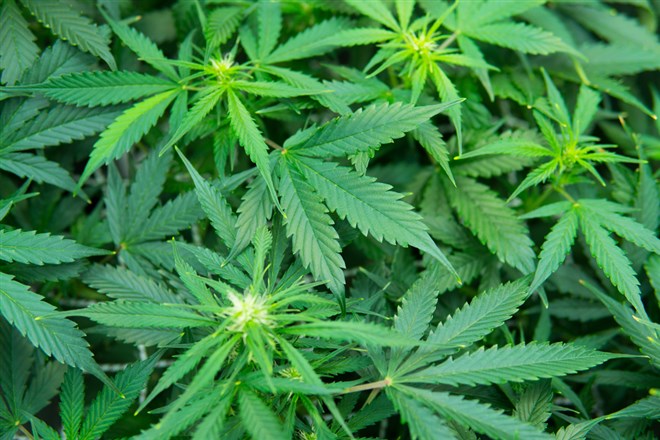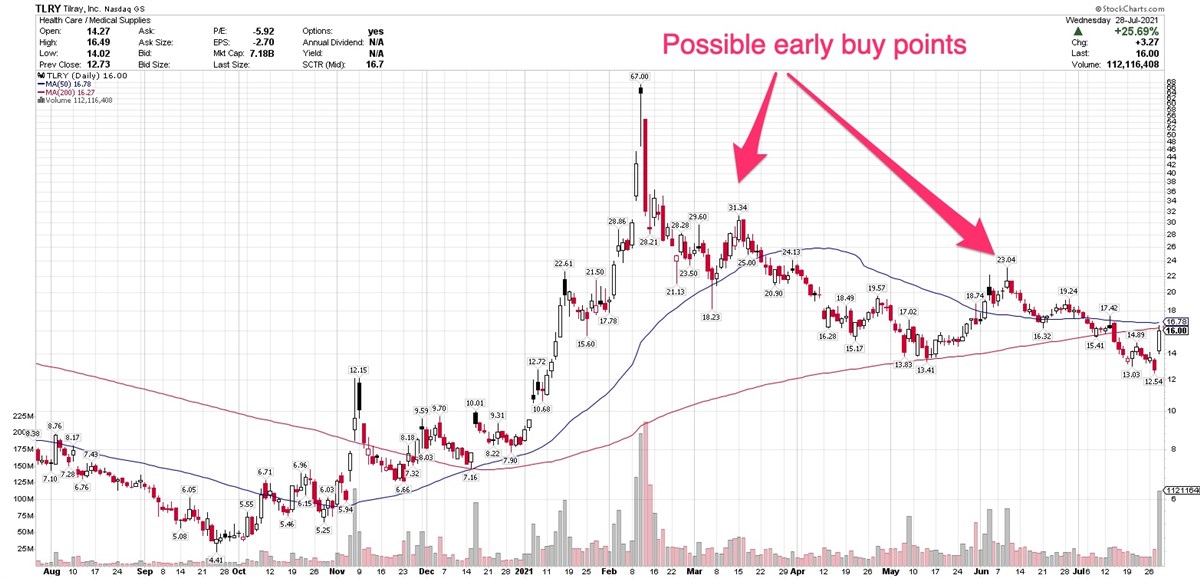
Canadian cannabis producer
Tilray NASDAQ: TLRY, which has been in a steep consolidation since mid-February, posted fourth-quarter income of $0.18 per share on revenue of $142.2 million.
Both those numbers represent year-over-year gains over the same quarter last year. Earnings topped views; however, revenue came in lower than expected.
Significantly the company reported an adjusted quarterly EBITDA increase of 285%, to $12.3, up from $3.2 million in the year-earlier quarter. That marked the ninth quarter in a row of positive adjusted EBITDA, which is a metric the cannabis industry tends to use as a performance benchmark.
Shares jumped more than 25% on the results. The stock gapped up as trading opened, and continued trending higher, although mid-session were down slightly from the earlier high of $16.32.
Upside volume was five times heavier than normal.
Despite investor enthusiasm, the net income reflected an unrealized gain in convertible debt, rather than being entirely attributable to revenue growth.
First Results Since Merger
Tuesday’s report was the first since Tilray merged with Aphria in a deal that closed May 3. Together, the two companies combined to create a market capitalization of $7.13 billion. That puts it behind fellow Canadian producer Canopy Growth NASDAQ: CGC, whose market cap stands at $7.45 billion.
In addition to the Canadian recreational cannabis line of business, the merger with Aphria means Tilray now has medical dispensaries in Latin America, Australia and Europe, as well as cultivation facilities around the world.
In the earnings release, CEO Irwin Simon stated, “Early results from the new Tilray affirm that, while the global cannabis market remains in its early stages, our vision, scale, access to resources, and operational excellence position us optimally to capitalize on the opportunity. In a very short period of time since our business combination was finalized, we transformed and strengthened Tilray, delivered solid results amid continued COVID-19 lockdowns and restrictions, and achieved $35 million in synergies to date – well on our way to delivering $80 million in cost savings over the next 16 months.”
Before closing the Tilray merger, Aphria acquired Atlanta-based SweetWater Brewing. The deal is widely believed to be in preparation for full federal cannabis legalization in the U.S., which some analysts expect to see in the next couple of years. At that point, industry analysts expect the cannabis beverage category to grow substantially.
In June, SweetWater began a collaboration with Canada’s Broken Coast Cannabis to develop a lager.
Covid Lockdowns Hurt Quarterly Revenue
In Wednesday’s earnings call, chief financial officer Carl Merton acknowledged that Covid lockdowns in Germany and Canada affected results in the quarter, as did the ability to source medical product from lower-cost producing countries to meet demand in Germany.
“I want to be clear that the orders and the demand were there. We simply could not source supply due to Covid restrictions. Another headwind in our Q4 performance for Europe was that medical patients who might otherwise load up on supply in advance of summer vacations and generate our traditional strong Q4 demand did not do so this year,” Merton said. “As a result of these conditions, net distribution revenue was $66.8 million for the quarter compared to $74 million in the fourth quarter of the prior year.”
He also cited problems in Canada, where lockdowns affected revenue. He noted that revenue at SweetWater continued to improve, but remained below pre-Covid levels at $15.9 million.
However, Simon noted that additional store openings should boost revenue once more Covid restrictions are lifted.
“To this point, there are currently over 2000 stores in Canada. We believe, growing the market demand could warrant as many as 3,000 by the end of calendar year 2022,” he said.
Tilray looks like it’s forming a double-bottom base, but the pattern is flawed. The ideal double-bottom buy point should be in the upper half of the structure, and that’s not the case here.
However, it’s true that investors may have to wait awhile for the stock to surpass its February 10 high of $67. That being the case, an early entry point may be either $23.04, reached on June 9, or $31.34, from March 15.

Before you consider Tilray Brands, you'll want to hear this.
MarketBeat keeps track of Wall Street's top-rated and best performing research analysts and the stocks they recommend to their clients on a daily basis. MarketBeat has identified the five stocks that top analysts are quietly whispering to their clients to buy now before the broader market catches on... and Tilray Brands wasn't on the list.
While Tilray Brands currently has a Hold rating among analysts, top-rated analysts believe these five stocks are better buys.
View The Five Stocks Here
Discover the next wave of investment opportunities with our report, 7 Stocks That Will Be Magnificent in 2025. Explore companies poised to replicate the growth, innovation, and value creation of the tech giants dominating today's markets.
Get This Free Report